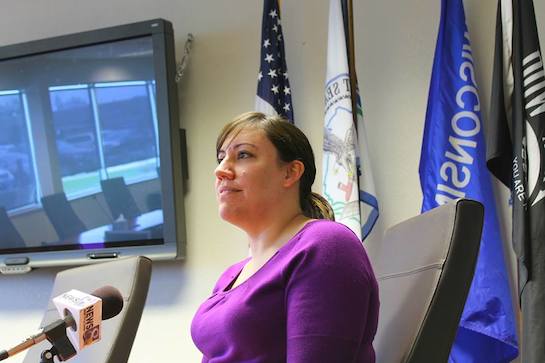Arvina Martin, Madison’s first Native American alder, confirmed Tuesday that she intends to run for Wisconsin Secretary of State.
Martin, who is Ho-Chunk and Stockbridge Munsee, is currently collecting signatures to place her name on the ballot in the August 14 primary against longtime incumbent Douglas La Follette. Jay Schroeder of Neenah is the only Republican registered.
Martin said she’ll make a formal announcement soon.
“I have supporters and friends across the state that are helping out,” she said. “Just trying to get out there, get my name out there and introduce myself to people and ask for their support.”
Martin said her top priority is election integrity.
“I’ve been thinking a lot about our political climate, and kind of where we are, just with everything that’s happening at the state, as well as the national level, and thinking about things that have been taken away from the secretary of state in Wisconsin, and kind of what the role is of other secretaries of state in other states,” she said. “It’s a lot about managing and protecting elections. I think that we’re at a point in time where we need to make sure that we are protecting access to the polls, making sure that all votes count, making sure that our districts are fair, they’re not gerrymandered. Making sure that we’re protecting things like the census, because we can’t possibly have fair counts unless our census is accurate.”
Martin has experience in election integrity, she said.
“In the last election cycle, I was a fellow with the Voter Protection Program here in Wisconsin,” she said. “Mostly before I got to the Voter Protection Program in 2016, it was a lot more grassroots, me talking to people and making sure that people knew what they needed and were empowered with the correct information and could go in and know that their vote was going to be counted. So it’s something that I’ve been doing, not strictly as a paid staff position, but it’s been something that I’ve been working on since I’ve been involved in elections.”
In Wisconsin, the Secretary of State keeps track of all official acts of the governor’s office and legislature as well as deeds for land, oaths of office, incorporation papers for towns and villages, and other similar functions. The office no longer handles business functions like incorporations and trademarks, which were stripped from the Secretary of State’s office by former Governor Tommy Thompson and further by Scott Walker.
La Follette is currently in his tenth term. He served one term in the 1970s and has subsequently held the office since 1983.
Martin did not directly say La Follette is doing a bad job, but did say the issues surrounding elections and access to the voting booth need to made more known.
“This would be using the platform to make sure that people know what’s going on and make sure that people have information, particularly people who are going to the polls, making sure that they have all the proper information that they need so that they can go make sure that their ballot is counted when they go vote. So at this point it’s kind of an advocacy role, but one that I would hope that we could get some of those responsibilities back in the secretary of state’s office so it could be more formal.”
La Follette, 77, called Martin’s candidacy “unfortunate.”
“People have a right to run for office. That’s how democracy works,” he said Tuesday. “It’s unfortunate because I think I’m doing a good job. I don’t know what the issue is. It’d be a lot nicer if we didn’t have an argument among democrats.”
La Follette noted that he won more than 70 percent of the vote the last time he got a serious primary challenge, in 2006, when progressive activist Scot Ross “spent a lot of money and worked really hard.”
If elected, Martin would be only the second woman of color to hold statewide office. Vel Phillips served as Secretary of State from 1979 through 1983.




























